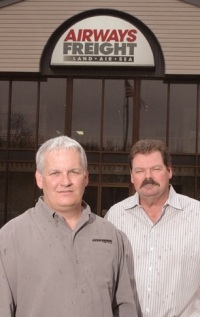Airways Freight Delivers Mission-Critical Cargo
by April 6, 2009 12:00 am 449 views

t(To see the list of the largest trucking firms and fleets in Northwest Arkansas, click here.)
Most of the 90 or so employees at Airways Freight Corp. in Fayetteville are multi-year veterans, many knocking on the two-decade mark.
There are so many employees grouped in the 15- and 16-year area, that Denny Wood, executive vice president, jokingly calls one operations man with only two years of service “rookie.”
Wood himself has worked for AFC for 23 years.
Keeping employees for the long haul is important to the company because it’s an international freight forwarder, which means it doesn’t own or operate assets like trucks, trailers, airplanes or boats. Seventy-five percent of AFC’s employees are logistics professionals who make sure a shipment gets from, say Tyler, Texas, to China on time. In an information-driven business, AFC’s principals said their employees are the asset.
“It’s the most important thing about our business,” CEO Dale Caudle said about maintaining quality people. “We wouldn’t be successful without that.”
The company made “just under” $60 million in revenue in 2008, Caudle said, up from a reported $30 million in 2001, so he’s invested in taking care of employees.
Downstairs from the nerve center where most of AFC’s logistics work is performed 24-hours a day, seven days a week is a rec room complete with industrial kitchen, a first-class fitness facility complete with dressing room, sauna, showers and lockers; and a courtyard turning out to several acres of lightly wooded area perfect for picnics or lunchtime strolls.
“You try to create an atmosphere of some place [employees] want to stay,” Caudle said. If you do that, then over time “culture becomes instilled and you don’t have to keep teaching it.”
Wood and Ken Center, president of AFC with 21 years at the company, both started in entry-level jobs and worked their way up.
“It makes it an easy place to run when you don’t have to keep training management,” Caudle said.
When asked to identify a few key people within the organization, Wood, who is also the general manager of Airways, was nonplussed. He looked out over the operations center and indicated that they’re “all key.”
Scratching Niches
Center said people drive by the company’s offices on Wedington Drive and wonder what AFC does. Some even stop to query.
Aside from an in-house travel agency that is a small portion of the firm’s business, the Airways Freight model is both simple and sophisticated.
AFC has a large room outfitted with low-walled cubicles where logistics and operations professionals figure out the most efficient way to get freight from one place to another by using a network of air, truck and ocean carriers.
At the logistics level, the work each operator does involves the minutia moving that freight step-by-step, carrier-by-carrier sometimes around the world.
The company employs no sales people, but it pays commissions to about 200 domestic and international agents that bring in business based on their relationships with clients. Center said this arrangement makes the company accountable to two layers of clients, so they have to over-deliver on promises.
Both Wood and Caudle said the priority on almost all the freight the company moves is time. Also, most of the freight isn’t run of the mill stuff that FedEx or UPS could cram in one of a few standard size boxes. They specialize in custom needs.
The company has actually shipped an entire industrial plant overseas for reassembly, and occasionally gets a call from a client that needs a very specific, very specialized O-ring from the only national maker. Now.
Over the years, Airways has carved out a few niches that depend on time-critical delivery — trade shows and exhibits, the utilities and nuclear power industries, and the medical industry are constants.
Caudle said employees sometimes see a need and will tell management they think there’s opportunity in a given industry. That’s how the company started in the medical field, he said.
Some clients in the nuclear and utilities industries have come to rely on Airways because it can get that example O-ring on a Lear jet and delivered within hours, drastically reducing downtime, Center said.
Both Center and Caudle said the economy hasn’t been a huge hit to Airways. Some trade show activity — which is between 55 percent and 60 percent of the company’s business — is down, but clients are still attending most of the shows because they still need to market themselves.
The time-critical nature of its customer base hasn’t changed, Center said.
